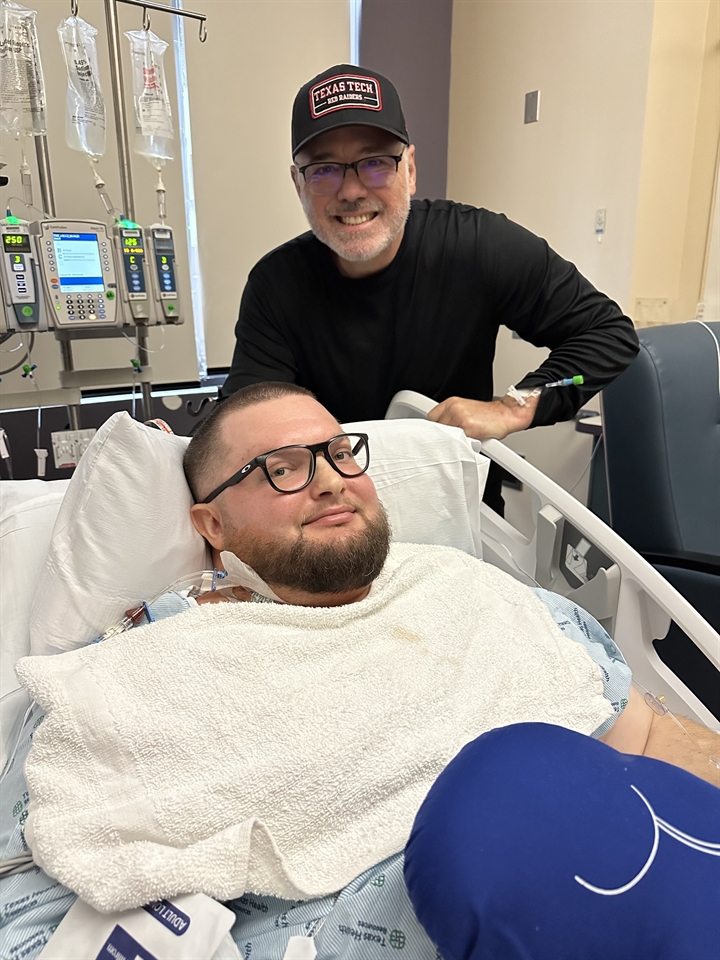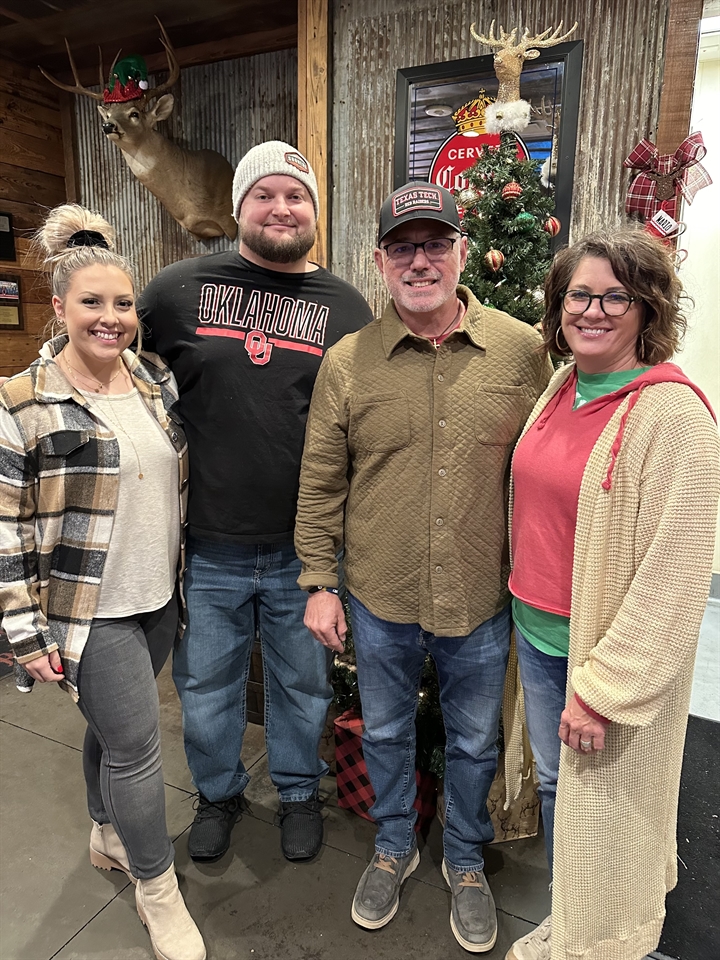Mason Williams was born in 1995 with one kidney but didn’t find out until the seventh grade.
That Christmas Break was one of the sickest he’s ever been, laying horizontal in his bed for two weeks, unable to move without puking. His parents drove him from their Oklahoma home to a Texas hospital, a trip that should’ve lasted five hours but instead stretched to 11 because they kept having to pull the car over to let Williams vomit.
The doctors found out his right kidney was infected. Then, they searched for the left one and found nothing.
A medical lightning strike had struck Williams for the second time. At 2 years old, he was diagnosed with Legg Calvé-Perthes disease in his hips - 1 in every 12,000 children is diagnosed, usually on one side. Williams had it in both.
“They said, ‘You’re probably never going to be able to play sports,’” Williams said. “Well, I played collegiate sports just to piss off the people who said I couldn’t do that.”
His family has had a ranch in Oklahoma since the land rush, and they started coaching football soon after that, beginning with Williams’s great-grandfather and trickling down to him, now the offensive line coach at Cleburne High School.
Williams tried every sport, but football was the only thing that gave him a physical release, an outlet for the pain his medical diagnoses caused. Because he could only dribble a basketball so hard on the pavement or swing a golf club so fast, but on the offensive line, there was another man across from him, and if he put his ass in the dirt he could prove those doctors wrong.
“It’s the only sport where gladiators still exist,” Williams said.
And he was a gladiator, an all-district player at Bryan Adams High School, a collegiate lineman at Southwestern Oklahoma State and Oklahoma Panhandle State. But his body was failing him below the armor his helmet and shoulder pads provided.
While humans are born with two kidneys, they only need one to function. Having one kidney is not a problem, but that one kidney failing is.
Williams was diagnosed with Gout at age 17, the first sign his kidney wasn’t working correctly. His eGFR, a measure of how well his kidney filtered waste, was 43 when the normal range was 60. But over the years, it kept dropping to 30, then to 20, signaling he needed to start dialysis, and finally, to 13 by his 25th birthday.
He’d just gotten married and had a baby daughter, and he’d need a kidney transplant if he wanted to watch her grow up.
…
Mike Treviño is many things - father, football coach and mountain climber. Pikes Peak in Colorado is his Everest. It’s a half marathon up and a half marathon down. Treviño had scaled it three times but never descended due to inclement weather.
This past June, he and a former player he coached at Lewisville High School in the 1990s drove out to Colorado to conquer Pikes Peak. On the first day, the warm-up, they scaled Mount Bross, Mount Cameron and Mount Lincoln, up and down, up and down, up and down, for nine hours. The next morning, they rose at 3:30 a.m. for the main event.
It took 12 hours to reach the summit, so high up it’s snowing in the summer. They meandered around the gift shop and grabbed lunch among large groups of people who’d paid to ride an elevator up the mountain and take a tour. But the view was more emotional for Treviño after climbing, at 55 years old, six months removed from losing his kidney.
He told friends he’d climb a mountain within six months of the surgery, a feat of mental strength as much as physical. Treviño had to prove to himself that the transplant wouldn’t limit him.
“I didn’t climb one mountain. I climbed four in two days,” Treviño said.
He and his partner made it down Pikes Peak at 11:45 p.m. that night, a lifelong goal accomplished and made so much more satisfying that it’d happened after the surgery.
“If I can inspire somebody else to make that decision and give a life, donate your spare, as they say, then I want to do that,” Treviño said.
This Friday night, Treviño, a special education teacher and football coach at Highland Park Middle School, will walk to midfield as an honorary captain for the coin toss for Highland Park’s district game against Cleburne High School.
Mason Williams, will stand across from him, the man Treviño gave his organ up for and gave another chance at life to.
Last season, Williams coached an entire season at Cleburne while doing at-home dialysis. After every practice, he’d grab his backpack and go home before everyone else to hop in bed and hook up to the machine, needing it to run a complete cycle before the next day’s work. And while the coaching staff knew why he was sluggish and had less color in his face, Williams never told the players. The only thing out of the ordinary was that Williams wasn’t attending away junior varsity games and needed to Zoom in for the Saturday morning film study.
But the schedule isn’t sustainable. The average life expectancy for a person on dialysis is 5-10 years. With Treviño’s kidney, Williams’s clock hasn’t just stopped ticking - it’s been reset.
“Even to this day, I wonder why anyone would do that,” Williams said. “Not in a negative way, but you’re literally giving a part of yourself to someone else.”
Williams has one of Treviño’s organs, but he still doesn’t understand the man.
The two coached together at the inner-city Fort Worth Polytechnic High School for two seasons but weren’t particularly close. Treviño, the running backs coach, was in his 50s with kids Williams’ age, fresh off two years as a graduate assistant at Southeastern Oklahoma State.
They lost touch after Williams went to Cleburne and Treviño to Highland Park. But three years ago, Williams was set to attend a Granbury vs Polytechnic scrimmage to scout Granbury and didn’t want to be the lone wolf in the stands. So he reached out to Treviño to see if he wanted to go watch their old program.
On the way to the game, Williams asked Treviño if he remembered him having one kidney. Matter-of-factly, he told his old colleague his kidney was functioning at 10 percent, and he needed a donor to survive long term. The news rocked Treviño, sitting next to this young man who’d just gotten married and had a daughter his granddaughter’s age, laying out his own mortality.
A couple weeks later, Treviño called Williams to let him know he was looking into the donor process. Williams was thankful but not hopeful. Plenty of people had told him they’d look into it, but the process isn’t as easy as having a blood match. The ideal donor has to have lived a substantial part of their life and be in peak physical condition. They spend a day at the hospital getting tested head-to-toe, and then it has to be approved by a committee of doctors.
Treviño pulls out a napkin and reads the stats showing how rare a match like his and Williams’s was. Ninety-thousand people are waiting for a donor in this country. The average wait time is three to five years, and 17 people die every day waiting. When presented with these figures, Williams says the online numbers don’t illustrate what he sees in clinics, where he gets treatment next to people who’ve been on dialysis for 12 years.
On November 7, the day of his daughter’s wedding, Treviño got a call while putting on his tie. His case had been unanimously approved by the panel of doctors. His kidney was a perfect match for Williams. The surgery was scheduled for December 22, 2023.
The doctors asked him on the operating table that morning if he wanted to change his mind, to which Treviño told them there’s never been a decision, other than marrying his wife, he’s been more confident in.
“If for some reason I don’t make it, my family is going to be ok and it’s what God wants me to do,” Treviño said. “Mason’s daughter will have a dad. Mason’s wife will have a husband.”

Friday night won’t be a reunion for Treviño and Williams. They talk at least twice a week now. Williams’ parents take them all out to dinner whenever they visit from Oklahoma. Treviño was at Mason’s daughter’s birthday. The most important thing to him was that Mason was there, too.
Treviño may have lost a kidney.
“I gained another family,” Treviño said.

This article is available to our Digital Subscribers.
Click "Subscribe Now" to see a list of subscription offers.
Already a Subscriber? Sign In to access this content.
